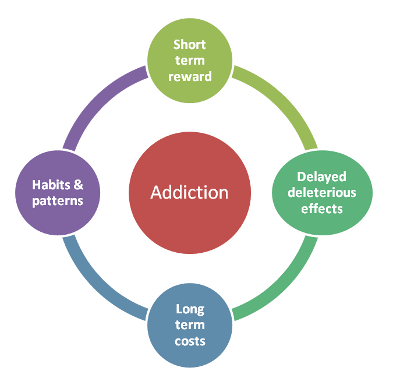
about addiction
- Impaired control over substances/behavior,
- Preoccupation with substance/behavior,
- Continued use despite consequences, and
- Denial.
- Over-generalized & illogical thinking pattern.
- Pessimistic approach towards life.
- Self – criticism & self-blame.
- Negative attitude about situations faced in life.
- Genetic factors-
- Environmental factors.
- Biological traits- There are few personality theories postulated to show the relationship of genetic factors with addiction.
- Gray’s Reinforcement Sensitivity Theory: Gray's Reinforcement Sensitivity Theory (RST) consists of two motivational systems: the Behaviour Inhibition System (BIS) and the Behaviour Activation System (BAS). The purpose of the BIS is to initiate behaviour inhibition, or interrupt ongoing behaviour, while the BAS is sensitive to stimuli that signal reward and/or relief from punishment (impulsivity). BAS sensitivity is involved in the initiation of addiction. BIS sensitivity is involved in avoiding negative situations or affect (such as withdrawal).
- Model of impulsivity: The model of impulsivity states that individuals high in impulsivity are at greater risk of addictive behaviours. The model proposes a two dimensional trait characteristic for the initiation and continuation of substance/behavioural abuse:
- Reward Drive (RD) - reflects individual differences in sensitivities to incentive motivation and engagement of addictive behaviour when reward cues are detected.
- Rash Impulsiveness (RI) - reflecting individual differences in the ability to modify the addictive behaviour due to negative consequences. Individuals high in RI are oblivious or insensitive to the negative consequences as a result of addictive behaviour when engagement is craved.
- Cloninger’s tri-dimensional personality theory: Cloninger's Tri-Dimensional Personality Theory states that personality comprises three genetically independent dimensions:
- Novelty seeking (NS) - tendency towards exploration and intense exhilaration in response to novel stimuli
- Harm avoidance (HA) - intense response to adverse stimuli and learned inhibited behaviour to avoid punishment
- Reward dependence (RD) - resistance to extinction of previously rewarded behaviour.
- If any physical or mental discomfort related with or after using any substance or alcohol.
- Inner desire to get rid off from addiction of any kind.
Addiction is a state of physiological and psychological dependence on a particular thing or substance. It is a disease affects directly on the interpersonal relationships of the person. Addiction affects each and every aspect of the afflicted person’s life; at physical, mental or psychological, and even at the spiritual-moral life of the person. The term addiction is used to describe a recurring compulsion by an individual to engage in some specific activity, despite harmful consequences, as deemed by the user themselves to their individual health, mental state, or social life.
Addiction is defined as the continued use of a mood altering substance or behavior despite adverse consequences. It also defined as physical and psychological dependence on psychoactive substances (for example alcohol, tobacco, heroin, caffeine and other drugs) which cross the blood brain barrier once ingested, temporarily altering the chemical milieu of the brain.
Some defining characteristics of addiction include-
Types of addiction
Hedonic Hypothesis which states that individuals initiate use of the substance/behavior for their pleasurable effects, but then take it compulsively to avoid withdrawal symptoms, resulting in dependence.
Causative factors in Addiction: This model was extended to alcohol use disorders proposing that individuals with alcohol use disorders have extreme temperaments (i.e. are very high or very low in NS, HA, and RD).
|
||||||||||||||||||||||||

